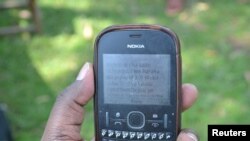The U.S. President’s Malaria Initiative, led by U.S. Agency for International Development, or USAID, and implemented together with the Centers for Disease Control and Prevention, and UNITEL, Angola’s leading telecommunication services provider, have entered a partnership agreement to optimize malaria prevention and control efforts. The partnership aims at increasing the accessibility and use of insecticide treated mosquito nets and malaria-related information in Angola.
The agreement allows USAID to tap into UNITEL’s mobile services to make malaria information available to UNITEL customers throughout Angola. Through improved connectivity, more Angolans will have free access to behavior change messages promoting the use of mosquito nets. The partnership will also expedite the Angolan health system’s transition from paper to digital information systems.
UNITEL currently has more than 11 million customers and approximately 3,500 employees, making it one of the largest private employers in the country. UNITEL’s largest corporate social responsibility initiative is its Stop Malaria Program.
In addition to the partnership with UNITEL, the President’s Malaria Initiative, or PMI, is supporting Angola’s Ministry of Health national campaign to distribute nearly 10 million mosquito nets, reaching every household in 15 provinces.
PMI is also providing assistance to Angola’s Ministry of Health for the national implementation of two software programs that will provide better, faster access to malaria surveillance and supply chain data.
USAID Mission Director Derrick Brown commented: “improving access to more accurate, timely, and complete information year-round, but especially during peak malaria season—including infection numbers, geographic spread and availability of medicines—will save lives.”
With technical assistance from USAID, UNITEL and other partners, Angola’s current plans to transition from paper-based to more digital data systems will be critical to the country’s ability to avoid stock-outs of antimalarial drugs in health centers and can result in better malaria services.
The United States is proud to work with its partner Angola to help protect the Angolan people from the deadly threat of malaria.












